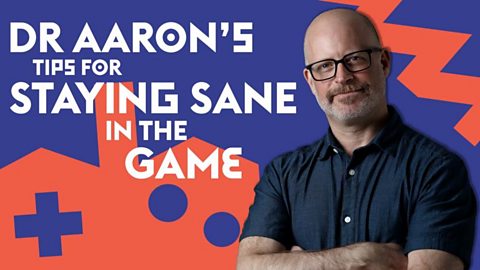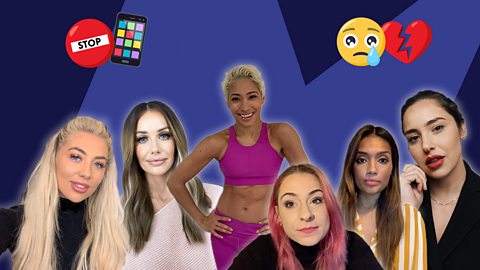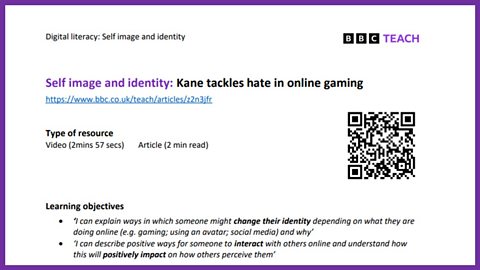Video summary
A video with online gamer Kane who gives tips and advice on how to tackle hate in online gaming.
He highlights the positives of gaming, focusing on encouraging teamwork, combatting toxic behaviour, taking screen breaks and speaking to an adult if someone feels unsafe.
Dr Aaron's tips for keeping cool when playing games online

When you're gaming, how much fun are you actually having? It’s not a silly question. Just because we game for fun, it doesn’t mean we always enjoy it, so it’s important to check in with yourself to see what’s happening.
If you stop every now and then and ask yourself, “how am I feeling right now?” you might find that you’re actually frustrated, or stressed out, or worried.
Stopping every now and then to ask yourself can make your gaming experience better. If you’re feeling frustrated, give yourself a break, recover, get some air, and come back.
While you want to enjoy yourself, some aspects of gaming may feel not so fun. For example, you might find yourself stuck in a “pack mentality” of other gamers getting aggressive, using scary language, bullying, or just making a bad scene.
It’s up to you to make a decision about whether this particular game is fun, and what you should do if it’s not. Can you help make it a more positive place, or is it better to sit this one out?
The first step is to really recognise and be honest about how it’s making you feel, and the second step is to make a choice. Need a break? Is it a good idea to give this one a miss? Maybe this team has a bad vibe? Be sensible about your gaming. Be honest about how it’s making you feel.
Identifying your feelings and choosing what works will make your gaming experience that much better.
You can also speak to a trusted adult or contact Childline for advice.
The BBC is not responsible for content on external sites.
Video: 2 mins 57 secs
Article: 2 min read
Learning objectives
(from the Education for a Connected World framework for 7-11 year olds set out by the UK Council for Internet Safety)
'I can explain ways in which someone might change their identity depending on what they are doingonline (e.g. gaming; using an avatar; social media) and why’
‘I can describe positive ways for someone to interact with others online and understand how this will positively impact on how others perceive them’
Glossary
- Gamer: someone who plays games
- Avatar: an online persona
- Identity: a set of qualities that make a person who they are
- Interact: to communicate with
- Positive: A force for good
- Negative: A force for bad
- Toxic: to behave in a negative and harmful way that directly affects others
Topic introductions and starters
Before the video:
- Ask pupils to write three positive and three negative experiences with online gaming don’t share this with others
After the video:
- Check pupils’ understanding of the key vocabulary – gamer, gaming, avatar, identity, interact, positive, negative, toxic
- In pairs write simple one sentence ‘dictionary’ definitions of key vocabulary – share with class, and decide on the best version
- Summarise the key points - either in pairs or as a class - discuss and agree on a final summary
- Explore some of the slang words used in the video - toxic, noob, thick skin, troll, owned, geek - can you agree on definitions?
- Make a list of positive and negative things about online gaming - are some things on both lists?
- In pairs, make a list of ways to deal with negative feelings and behaviour when gaming - share with the class
Discussion Points
Why do you think people get so angry/upset when playing a game? Worrying about winning? Feeling the pressure? Want to keep up their reputation? Don’t want to let team mates down?
What would you say to someone who has experienced negative reactions while gaming? Ignore it? Give as good as you get? Report it?
How can you tell the difference between banter and bullying? When does banter go too far? How much should you be able to take?
Have you ever felt like saying something negative when gaming? Did you find a way to avoid it? Did you feel peer pressure?
Have you experienced gamer hate? How did it make you feel? Were you able to brush it off? How did you respond?
When should you ask for help? Feeling unsafe? It feels more like bullying? Worried about a friend or team-mate?
Fillers and fast finisher activities
- Create a memorable slogan to help gamers stay cool under pressure
- Make a wordsearch or crossword using gamer vocabulary for classmates to try out
- Create a quiz about gamer slang - true/false questions about definitions
Signposting potential homework activities
- Make a top-tips poster for positive gaming behaviour
- Make a self-checklist to use during game play to support your own positive behaviour and reactions
- Write a help guide with tips for helping a teammate who is not coping well - how can you help them?
- Create a job advert for a “Perfect Gaming Team Player” with a list of attributes needed - stays cool under pressure, helps teammates, etc.
More from: Self-image and identity
How to stay safe when setting up gaming profiles. video
An animated video looking at setting up a personal profile for an online game.

Should we edit our selfies? video
Presenter Lauren Layfield talks about how much work goes into perfecting photos, and how selfies aren't always what they seem.

Celebrities on bullying and social media video
Celebrities share some of the negative comments they’ve received online.

